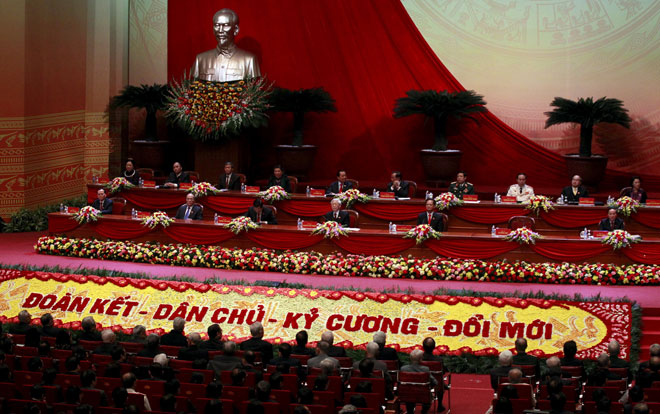
Politburo members of Vietnam’s Communist Party are seen at the opening ceremony of the 12th National Congress of Vietnam’s Communist Party in Hanoi, Vietnam. — Reuters photo
HANOI: Vietnam began a crucial political transition yesterday as the five-yearly Communist Party congress convened to pick new leaders amid a bitter factional fight, the outcome of which could set the pace of key economic reforms.
Police closed roads and jammed mobile phone signals as communist leaders and some 1,500 party delegates met in Hanoi for week-long closed-door talks.
The country’s top three positions – party general secretary, president and prime minister – are up for grabs. As delegates gathered in a vast hall under portraits of revolutionary leaders Ho Chi Minh, Marx and Lenin, there were indications that the party old guard would push out pro-market leaning reformers led by Prime Minister Nguyen Tan Dung.
“Nguyen Tan Dung’s political career can be declared ‘clinically dead,’” one senior communist party official, speaking on condition of anonymity, told AFP.
Dung, who presided over Vietnam joining the World Trade Organisation and the US-led Trans Pacific Partnership (TPP) trade deal, had been tipped by analysts to move up to the powerful position of party general secretary.
While many cautioned it was too early to rule him out entirely, they said his name does not appear on a leaked list of candidates for the top leadership posts. Any sidelining of Dung would be a victory for incumbent party leader Nguyen Phu Trong – a conservative apparatchik who has been manoeuvring to extend his term and install allies in top positions.
“The path of socialism is still suitable to the reality in Vietnam,” Trong, who is seen as closer to Beijing, said as he opened the meeting yesterday.
Dissidents had warned that Dung risked becoming ‘Vietnam’s Putin’ if he was promoted to party leader, in reference to his hanging on to power beyond the two-term limit he has served as Prime Minister. Despite prior allegations of corruption, he is the preferred choice for the top post of most foreign investors, eager for greater access to the rapidly growing consumer market of some 90 million people.
To ordinary Vietnamese the congress is a bloated re-run of internal party battles with little bearing on their day-to-day lives.
“I don’t like any of this country’s leaders but if I could choose, I’d pick the business-minded ones,” Duc Trung, 37, told AFP, rather than the ideologues ‘with their theories which have no bearing on reality.’ — AFP
